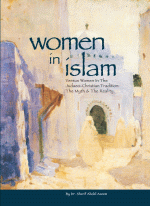Women In Islam versus Judaeo-Christian Tradition The Myth & The Reality

13. Female Inheritance?
One of the most important differences between the Quran and the Bible
is their attitude towards female inheritance of the property of a
deceased relative. The Biblical attitude has been succinctly described
by Rabbi Epstein: "The continuous and unbroken tradition since the
Biblical days gives the female members of the household, wife and
daughters, no right of succession to the family estate. In the more
primitive scheme of succession, the female members of the family were
considered part of the estate and as remote from the legal personality
of an heir as the slave. Whereas by Mosaic enactment the daughters were
admitted to succession in the event of no male issue remained, the wife
was not recognised as heir even in such conditions." 44 Why were the
female members of the family considered part of the family estate?
Rabbi Epstein has the answer: "They are owned --before marriage, by the
father; after marriage, by the husband."
The Biblical rules of inheritance are outlined in Numbers 27:1-11. A
wife is given no share in her husband's estate, while he is her first
heir, even before her sons. A daughter can inherit only if no male
heirs exist. A mother is not an heir at all while the father is. Widows
and daughters, in case male children remained, were at the mercy of the
male heirs for provision. That is why widows and orphan girls were
among the most destitute members of the Jewish society. Christianity
has followed suit for long time. Both the ecclesiastical and civil laws
of Christendom barred daughters from sharing with their brothers in the
father's patrimony. Besides, wives were deprived of any inheritance
rights. These iniquitous laws survived till late in the last century.
Among the pagan Arabs before Islam, inheritance rights were confined
exclusively to the male relatives. The Quran abolished all these unjust
customs and gave all the female relatives inheritance shares: "From
what is left by parents and those nearest related there is a share for
men and a share for women, whether the property be small or large --a
determinate share" (4:7). Muslim mothers, wives, daughters, and sisters
had received inheritance rights thirteen hundred years before Europe
recognised that these rights even existed. The division of inheritance
is a vast subject with an enormous amount of details (4:7,11,12,176).
The general rule is that the female share is half the male's except the
cases in which the mother receives equal share to that of the father.
This general rule if taken in isolation from other legislations
concerning men and women may seem unfair. In order to understand the
rationale behind this rule, one must take into account the fact that
the financial obligations of men in Islam far exceed those of women
(see the "Wife's property?" section). A bridegroom must provide his
bride with a marriage gift. This gift becomes her exclusive property
and remains so even if she is later divorced. The bride is under no
obligation to present any gifts to her groom. Moreover, the Muslim
husband is charged with the maintenance of his wife and children. The
wife, on the other hand, is not obliged to help him in this regard. Her
property and earnings are for her use alone except what she may
voluntarily offer her husband. Besides, one has to realise that Islam
vehemently advocates family life. It strongly encourages youth to get
married, discourages divorce, and does not regard celibacy as a virtue.
Therefore, in a truly Islamic society, family life is the norm and
single life is the rare exception. That is, almost all marriage-aged
women and men are married in an Islamic society. In light of these
facts, one would appreciate that Muslim men, in general, have greater
financial burdens than Muslim women and thus inheritance rules are
meant to offset this imbalance so that the society lives free of all
gender or class wars. After a simple comparison between the financial
rights and duties of Muslim women, one British Muslim woman has
concluded that Islam has treated women not only fairly but generously.
